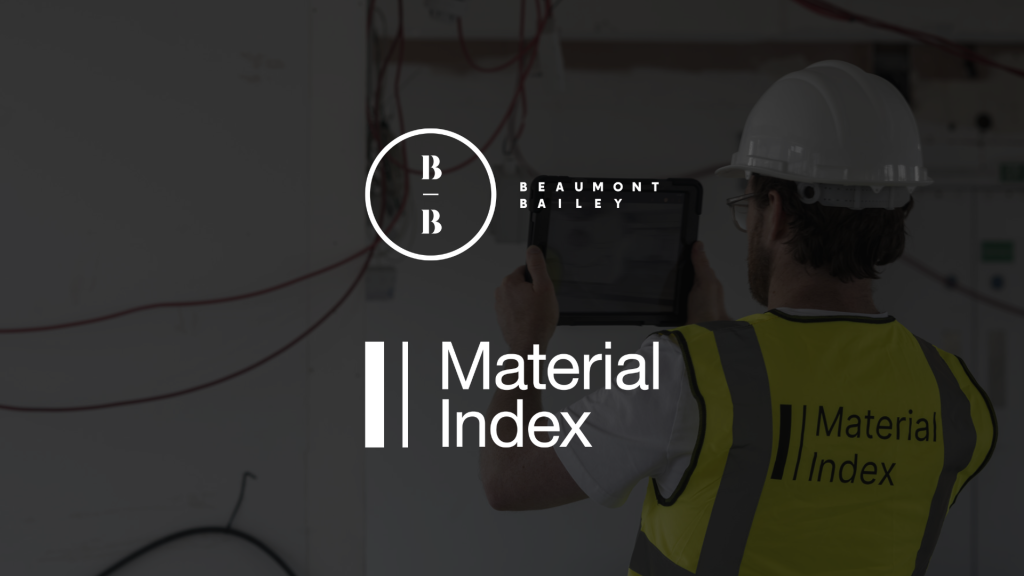Technology Spotlight: Insights from Material Index
By Emma Callahan

As part of Beaumont Bailey’s mission to connect founders, innovators, and key players that make up the fabric of our industry, our latest Technology Spotlight series highlights the success of our incredible members and wider network. In this instalment, we speak with Rob Smith, Co-Founder of Material Index.
When you speak to Rob Smith, it’s clear sustainability has always been at the heart of his story, even if his career path didn’t start that way.
“I’ve always been sustainability-minded,” he says, recalling how his mother ran the environment club at his primary school. “I was the kid recycling soda cans before it was fashionable.”
Yet Rob’s first professional move was into the oil industry. The choice, he explains, wasn’t about values but about gaining engineering experience. From there, he pivoted into property development, where he took great pleasure in restoring old buildings. Still, a nagging question lingered: How could he align his work with his deeper mission to tackle the climate crisis?
That clarity came when he met his co-founder, Morgan Lewis, an architect. Morgan had long wanted to incorporate secondary materials, such as reclaimed components from old buildings, into his projects, but was frustrated by the lack of a reliable supply. Rob realised he had been living the same problem from the other side, trying to resell quality materials stripped out of his developments on Facebook Marketplace or Gumtree.
“Neither side of the market worked,” Rob explained. “Morgan couldn’t find what he needed, and I couldn’t get rid of things without them going to waste. It was obvious we had to build something.”
It comes as no surprise, then, that in 2023, Material Index was born.
A Different Kind of Marketplace
The vision for Material Index was always bigger than a simple listings site. “We use the word marketplace, we view it more as a procurement platform,” Rob explains. “It’s about the dynamics behind it, connecting supply and demand at scale.”
That meant starting with the supply side. The company quickly became known for pre-demolition audits, meticulously cataloguing every reusable item in a building, including doors, windows, flooring, lighting, and more. Unlike competitors who stopped at broad assessments, Material Index went deep, enabled by its own technology platform.
But Rob knew software alone wouldn’t move the needle. “Construction companies are pitched SaaS products all the time; they’re fatigued,” he says. “What they value is service.”
So, Material Index built a boots-on-the-ground model, with logistics specialists and operatives working alongside demolition crews to physically recover and resell materials. It’s this blend of tech platform and high-touch service that makes the business unique.
Building a Market
Material Index now collaborates with major developers and landlords, including Derwent London, British Land, Related Argent and the Canary Wharf Group. On one side, it helps these building owners audit and sell the materials they’re stripping out; on the other, it connects them with resellers, contractors, and designers who want to buy them.
The sweet spot so far has been office refurbishments in London, where fast refit cycles and tenant demand for sustainable spaces are driving momentum. However, the opportunity spans far wider, from shopping centres, gyms, and car parks to even infrastructure like roads and bridges.
One standout project, undertaken with the London Legacy Development Corporation, illustrates the impact. Tasked with auditing an old Thames Water pumping station, the team catalogued everything from pumps and valves to hydraulic systems. They then found specialist buyers, arranged logistics, and ultimately generated £12,000 in revenue for the client.
“Normally, they would have paid someone to rip it all out and throw it away,” Rob says. “Instead, we saved them the cost of removal and gave them money back. That’s double value.”
Growing with Purpose
Just over a year in, Material Index has grown to a team of 12 employees and four contractors. Rob is quick to credit the passion of his young team for driving the mission forward. “The average age is mid-20s, and they really care about what they’re doing,” he says.
That passion comes with challenges. Hiring, Rob admits, is both a time sink and a constant priority. Early recruits, such as Liv, who leads the auditing team, and Oliver, who heads the brokerage, have become foundational. However, as the business matures, he recognises that they require more senior expertise, particularly in sustainability and carbon management.
“There’s no silver bullet to hiring,” he reflects. “Referrals, recruiters, LinkedIn outreach, they all play a part. The important thing is to act quickly, or you lose good candidates.”
Into the Future
Material Index is now preparing for its next funding round to scale operations. An interim raise from existing investors will bridge the gap and enable a few key hires in the meantime.
The vision for the next 3-5 years is ambitious: To become the go-to marketplace for secondary materials, embedded across the built environment. Beyond auditing and logistics, Rob sees the company shaping how architects, designers, and developers think about sourcing and normalising reuse at scale.
“At its core, this is about tackling one of the biggest sources of waste and carbon in our economy,” Rob says. “If we can make reclaimed materials as easy to specify and procure as new ones, that’s transformational.”
Overall Takeaways:
Material Index is more than a tech platform; it’s a systems-level rethink of how materials flow through the built environment. By combining data, services, and logistics, Rob Smith and his team are proving that reuse isn’t just a sustainability talking point, but a scalable business model.
And while the journey is only beginning, I believe one thing is clear: The days of demolition waste being casually discarded may be numbered.
 If you would like to discuss any of the topics raised in this piece, or if you need support with your leadership resourcing strategy, please get in touch with Emma Callahan on: emma.callahan@beaumontbailey.com.
If you would like to discuss any of the topics raised in this piece, or if you need support with your leadership resourcing strategy, please get in touch with Emma Callahan on: emma.callahan@beaumontbailey.com.





